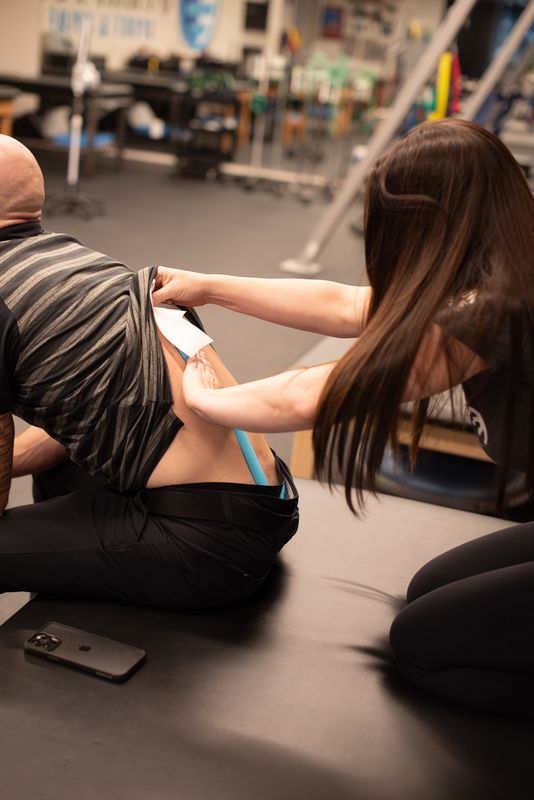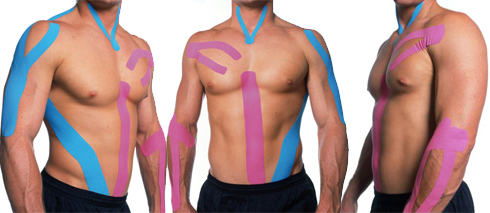Call Us Now!
Phone 210.837.8244
Kinesio Taping
Kinesio Taping gives support and stability to your joints and muscles without affecting circulation and range of motion. It is also used for Preventive Maintenance, Edema, and to treat pain. Kinesio Taping is a technique based on the body's own natural healing process. This Kinesio Taping exhibits its efficacy through the activation of neurological and circulatory systems. This method basically stems from the science of Kinesiology, hence the name "Kinesio". Muscles are not only attributed to the movements of the body but also control the circulation of venous and lymph flows, body temperature, etc. Therefore, the failure of the muscles to function properly induces various kinds of symptoms. Consequently, so much attention was given to the importance of muscle function that the idea of treating the muscles in order to activate the body's own healing process came about. Using an elastic tape, it was discovered that muscles and other tissues could be helped by outside assistance. Employment of Kinesio Taping creates a totally new approach to treating nerves, muscles, and organs. The first application of Kinesio Taping was for a patient with articular disorders.

For the first 10 years, orthopedists, chiropractors, acupuncturists and other medical practitioners were the main users of Kinesio Taping. Soon thereafter, Kinesio Taping was used by the Japanese Olympic volleyball players and word quickly spread to other athletes. Today, Kinesio Taping is used by medical practitioners and athletes around the world. The Kinesio Taping Method is applied over muscles to reduce pain and inflammation, relax overused tired muscles, and to support muscles in movement on a 24hr/day basis. It is non-restrictive type of taping which allows for full range of motion. In contrast, traditional sports' taping is wrapped around a joint strictly for stabilization and support during a sporting event obstructing the flow of bodily fluids as an UNDESIRABLE side-effect.
Kinesio Tape is used for anything from headaches to foot problems and everything in between. Examples include: muscular facilitation or inhibition in pediatric patients, carpal tunnel syndrome, lower back strain/pain (subluxations, herniated disc), knee conditions, shoulder conditions, hamstring, groin injury, rotator cuff injury, whiplash, tennis elbow, plantar fasciitis, patella tracking, pre and post surgical edema, ankle sprains, athletic preventative injury method, and as a support method.
Kinesio Taping Concepts

Muscles constantly extend and contract within a normal range; however, when muscles over-extend and over-contract, such as when lifting an excessive amount of weight, muscles cannot recover and become inflamed. When a muscle is inflamed, swollen or stiff due to fatigue, the space between the skin and muscle is compressed, resulting in constriction to the flow of lymphatic fluid. This compression also applies pressure to the pain receptors beneath the skin, which in turn communicates, "discomfort signals" to the brain and the person experiences PAIN. This type of pain is known as myalgia, or muscular pain.
Conventional athletic tape is designed to restrict the movement of affected muscles and joints. For this purpose, several layers of tape must be rolled around and/or over the afflicted area, applying significant pressure, resulting in the obstruction of the flow of bodily fluids as an UNDESIRABLE side-effect. This is also the reason athletic tape is generally applied immediately before the sports activity, and removed immediately after the activity is finished. On the other hand, Kinesio Taping is based on a different philosophy that aims to give free range of motion in order to allow the body's muscular system to heal itself bio-mechanically. To ensure that the muscles have free range of motion, tape with an elasticity of 130-140% of its original length is used for Kinesio Taping. This specific elasticity also will not allow an over stretch of the muscles themselves. It may look like conventional athletic tape, but Kinesio Tex Tape is fundamentally different.
A La Carte Pricing (non-appointment day): $10 per body region
Services
- HIVAMAT
- EPAT- Extracorporeal Pulse Activation Technology
- Orthobiologic Medicine (coming soon)
- Trigger Point Dry Needling
- Blood Flow Restriction (BFR) Training
- Fascial Distortion Model (FDM)
- Chiropractic Care
- Active Release Technique
- Kinesio Taping
- Graston Technique
- Selective Functional Movement Assessment (SFMA)
- Spinal Decompression Services
- NormaTec Recovery System


